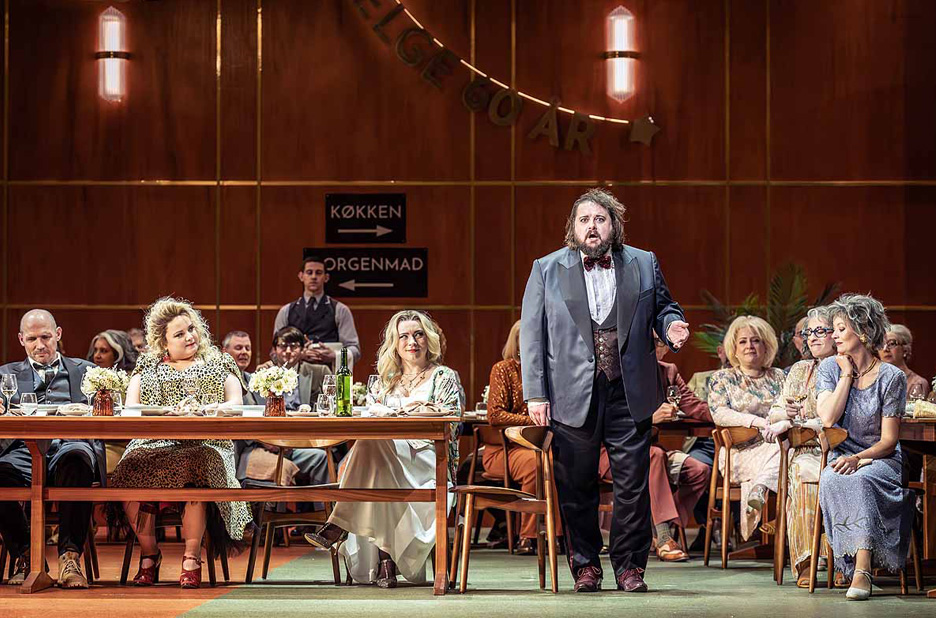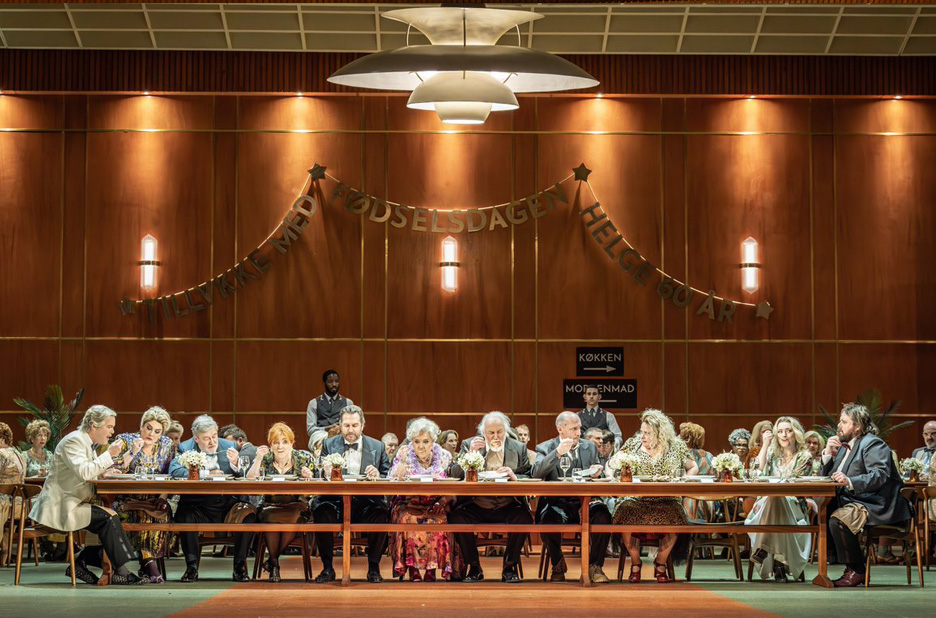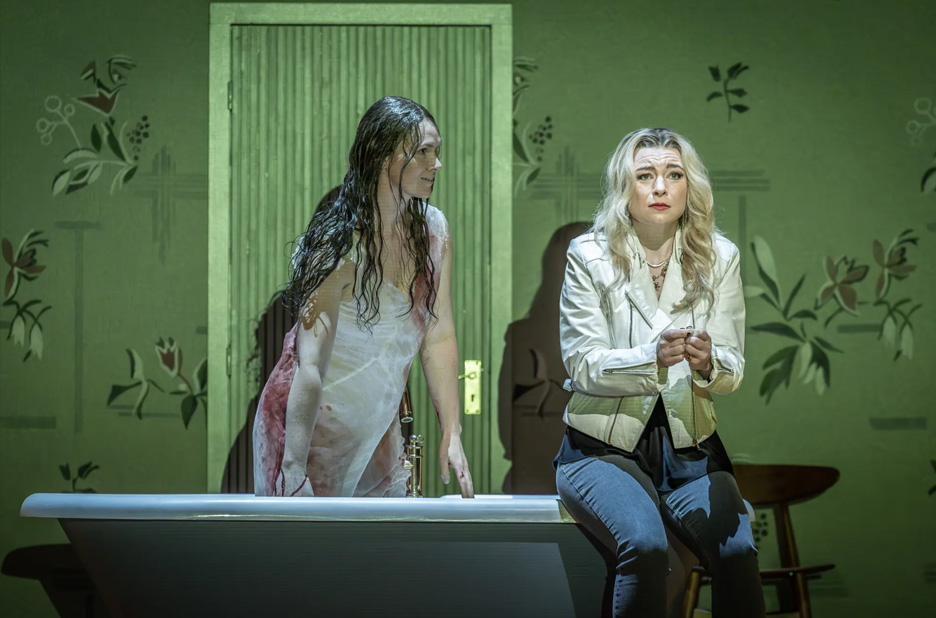Music
Festen
Royal Opera House, London
5/5
Contemporary opera at its best
I was lucky to be given free tickets for the general rehearsal of Festen, just opening at the Royal Opera House, a new opera by Mark-Anthony Turnage based on Thomas Vinterberg’s acclaimed film Festen. And what a treat it was. This gripping and powerful multifaceted adaptation is exactly what contemporary opera should be like.


I was curious about this production because the story told in the film seemed perfect for contemporary opera. It is a harrowing and authentic narrative about the aftermath of abuse that unlike most traditional opera stories is fully believable. It is on a socially important topic that traditional opera also doesn’t address. It contains plenty of drama and suspense, and some violence: verbal, emotional and physical, and a large ensemble in an enclosed space. A story of an abuser who not only doesn’t want to admit to his criminality but thinks it’s his right to abuse, backed by the hypocrisy of wealth and endlessly excused by alleged upstanding citizenship. A story of victims who are ultimately left alone to carry the burden of trauma. And above all, a story of enablers, the whole lot of them.
Festen opens in a large deserted old-fashioned lobby of a Danish hotel, with the lead character Christian listlessly waiting for someone to check him in. We are in the family hotel where the patriarch Helge is about to celebrate his 60th birthday in a large lavish celebration orchestrated by a master of ceremonies. Christian is Helge’s son and he has arrived from Paris for the celebrations. The tension is already present as he waits for someone to appear. The dysfunctionality of the family becomes quickly apparent, but nobody can expect what is to come.
This opera is a seamless fusion of theatre and music, in a way that we don’t often see, and certainly need more of. Opera as a genre is supposed to be such a balanced all-encompassing union, but classical opera repertoire tends to be unable to deliver it for contemporary audiences. The score by Mark-Anthony Turnage does not overwhelm the words and action but instead enacts them and supports them with sensitivity and respect. Another small benefit of the precise and unfussy word-setting is that the words are clear to understand and consequently there is less need to constantly monitor the surtitles. Helge’s lines, sung by Gerald Finley, are the very embodiment of musical banality. At first this may seem underwhelming, but its purpose becomes clear as we start to see his character. Helge is really just a simple human example of the banality of evil. His wife is appropriately shrill in her denial and defence of her false respectability.

The children, Christian, Helene and Michael, are given more depth in the score as befits the complexity of their characters. All three singers perform beautifully. Allan Clayton’s passive, numb and gentle tenor explains Christian’s presence in the world. He can only confront his father in his own way, civilised and calm. But the confrontation inevitably will take its toll and we get to see him angry and broken. Natalya Romaniw’s stunning soprano stands out in her role as Helena, although I felt her acting was not as strong. Michael, sung by baritone Stéphane Degout, is the volatile character in the mix, another bully in the family, who becomes the physical embodiment of the revenge which is not his to take. The ghost of the dead sister, Linda, also gets a couple of lovely musical contributions. These kinds of ethereal and supernatural moments perhaps work better in an opera than they do in the film, and Linda’s last appearance to her brother in particular is delicately staged. The Royal Opera Chorus gets a wonderful opportunity here to impress in multiple group scenes of celebration, singing, dancing and acting, providing the perfect backdrop and atmosphere for the events which unfold.
The libretto by Lee Hall in a fine adaptation and the deft direction by Richard Jones shapes the piece exceedingly well. I was surprised by the quality of the direction, as I really disliked Richard Jones’ Machinal at the Old Vic, but it seems opera is more where his strength lies. Irony is difficult to represent in opera and this was perhaps the crucial challenge. But there were many very successful moments brimming with irony: the grand-dad’s bawdy speech straight after Christian’s denunciation, the conga dance in the middle of the evening – probably the only moment of genuine and needed light relief, the crucial final scene which masterfully represents Christan’s numbness amid hypocritical relatives and friends.
When to Christian’s desperate question ‘Why?’ Helge answers because this is all you were good for, this blunt and stunning revelation of the depths of his depravity represents the structural climax nobody wanted, but as in every good tragedy, it has an important cathartic function. Indeed the original film script written by Thomas Vinterberg and Morgens Rukov is in the mould of a Greek tragedy. I was glad Hall kept the title ‘Festen’ without anglicising it and kept the action in Denmark with Danish characters as this is part of the narrative’s strength and authenticity.

There were some weaker moments. When Christian’s sister Helena finds Linda’s suicide note in her room, this is played in an artificially operatic way when a naturalistic approach would have been more convincing and appropriate. The chef who is Christian’s old friend was unfortunately featured too summarily for the audience to understand his role and the uniqueness of his position as Christian’s only genuine support. The role of silence could perhaps have been accentuated even more.
The set by Mirium Buether gives a strong contribution to the staging. There is the haunting lobby that opens and closes the opera and an interesting open view of three hotel rooms at the same time where multiple narrative strands develop simultaneously and consequently. As in the film, the old-fashioned country grandeur brings a chill with it.
The production also succeeded in bringing the sadness of the story to the fore, most poignantly when Helena reads Linda’s suicide note as her happy birthday speech to her father. And in the final scene where we see that nothing has changed and nothing can possibly change. I have to stress that it is rare to be genuinely moved at the opera, not just by recognising known melodies and being enthralled by singers’ prowess, but by the work as a whole, and I’m impressed by the convergence of skills and forces that have made this possible in Festen.
This opera deserves packed audiences and rave reviews and I really hope it gets them.